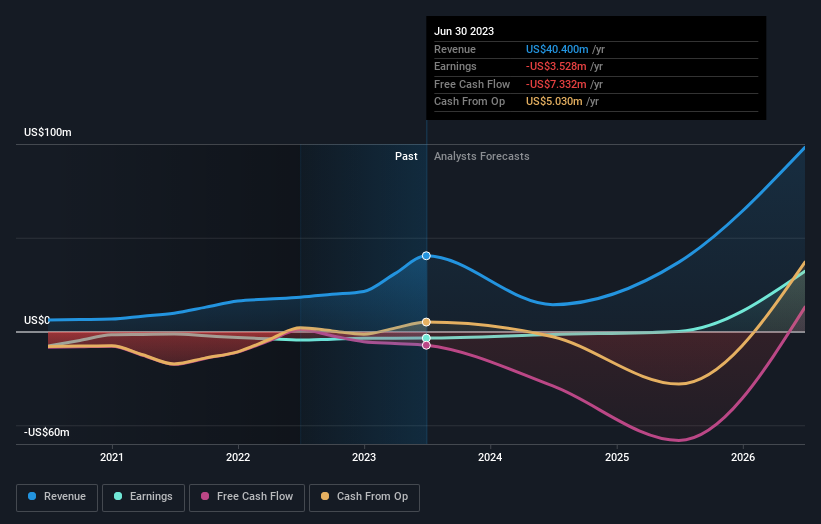individual investors who own 55% along with institutions invested in Peninsula Energy Limited (ASX:PEN) saw increase in their holdings value last week
Key Insights
Significant control over Peninsula Energy by individual investors implies that the general public has more power to influence management and governance-related decisions
45% of the business is held by the top 25 shareholders
Institutions own 40% of Peninsula Energy
Every investor in Peninsula Energy Limited (ASX:PEN) should be aware of the most powerful shareholder groups. The group holding the most number of shares in the company, around 55% to be precise, is individual investors. In other words, the group stands to gain the most (or lose the most) from their investment into the company.
Following a 44% increase in the stock price last week, individual investors profited the most, but institutions who own 40% stock also stood to gain from the increase.
Let's delve deeper into each type of owner of Peninsula Energy, beginning with the chart below.
See our latest analysis for Peninsula Energy

What Does The Institutional Ownership Tell Us About Peninsula Energy?
Many institutions measure their performance against an index that approximates the local market. So they usually pay more attention to companies that are included in major indices.
As you can see, institutional investors have a fair amount of stake in Peninsula Energy. This suggests some credibility amongst professional investors. But we can't rely on that fact alone since institutions make bad investments sometimes, just like everyone does. If multiple institutions change their view on a stock at the same time, you could see the share price drop fast. It's therefore worth looking at Peninsula Energy's earnings history below. Of course, the future is what really matters.

Peninsula Energy is not owned by hedge funds. ALPS Advisors, Inc. is currently the largest shareholder, with 8.3% of shares outstanding. With 8.3% and 6.2% of the shares outstanding respectively, State Street Global Advisors, Inc. and Morgan Stanley, Investment Banking and Brokerage Investments are the second and third largest shareholders. In addition, we found that Wayne Heili, the CEO has 0.7% of the shares allocated to their name.
A deeper look at our ownership data shows that the top 25 shareholders collectively hold less than half of the register, suggesting a large group of small holders where no single shareholder has a majority.
While it makes sense to study institutional ownership data for a company, it also makes sense to study analyst sentiments to know which way the wind is blowing. There are plenty of analysts covering the stock, so it might be worth seeing what they are forecasting, too.
Insider Ownership Of Peninsula Energy
The definition of an insider can differ slightly between different countries, but members of the board of directors always count. Company management run the business, but the CEO will answer to the board, even if he or she is a member of it.
I generally consider insider ownership to be a good thing. However, on some occasions it makes it more difficult for other shareholders to hold the board accountable for decisions.
We can report that insiders do own shares in Peninsula Energy Limited. As individuals, the insiders collectively own AU$3.0m worth of the AU$164m company. It is good to see some investment by insiders, but we usually like to see higher insider holdings. It might be worth checking if those insiders have been buying.
General Public Ownership
The general public -- including retail investors -- own 55% of Peninsula Energy. This level of ownership gives investors from the wider public some power to sway key policy decisions such as board composition, executive compensation, and the dividend payout ratio.
Private Company Ownership
We can see that Private Companies own 3.2%, of the shares on issue. It might be worth looking deeper into this. If related parties, such as insiders, have an interest in one of these private companies, that should be disclosed in the annual report. Private companies may also have a strategic interest in the company.
Next Steps:
While it is well worth considering the different groups that own a company, there are other factors that are even more important. For instance, we've identified 1 warning sign for Peninsula Energy that you should be aware of.
If you are like me, you may want to think about whether this company will grow or shrink. Luckily, you can check this free report showing analyst forecasts for its future.
NB: Figures in this article are calculated using data from the last twelve months, which refer to the 12-month period ending on the last date of the month the financial statement is dated. This may not be consistent with full year annual report figures.
Have feedback on this article? Concerned about the content? Get in touch with us directly. Alternatively, email editorial-team (at) simplywallst.com.
This article by Simply Wall St is general in nature. We provide commentary based on historical data and analyst forecasts only using an unbiased methodology and our articles are not intended to be financial advice. It does not constitute a recommendation to buy or sell any stock, and does not take account of your objectives, or your financial situation. We aim to bring you long-term focused analysis driven by fundamental data. Note that our analysis may not factor in the latest price-sensitive company announcements or qualitative material. Simply Wall St has no position in any stocks mentioned.

 Yahoo Finance
Yahoo Finance 